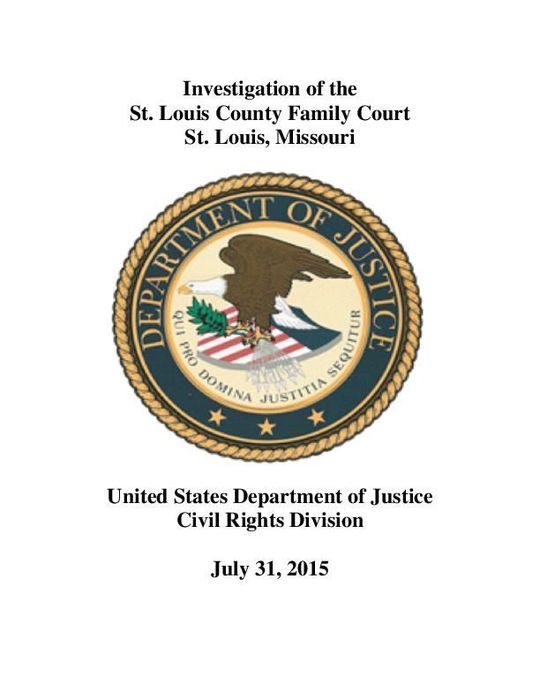ST. LOUIS, MISSOURI
St. Louis County Family Court agreed to reform its courts to solve the department’s findings of serious and systematic violating the constitutional rights of black youth, according to federal officials.
The Department of Justice wants to protect juveniles by making sure they get due process and equal protection under the law.
To read the entire agreement click here: Department of Justice
This is the fourth agreement the department has entered into under the Violent Crime Control and Law Enforcement Act of 1994 to address constitutional violations within a juvenile justice system.
The investigation into Family Court, opened in November 2013, was conducted by the Civil Rights Division’s Special Litigation Section under provisions of the Violent Crime Control and Law Enforcement Act of 1994.
In July 2015,  the department issued a findings letter concluding that the St. Louis County Family Court violates the 14th Amendment of the Constitution by failing to ensure that juveniles facing delinquency charges receive adequate due process protections and failing to provide black youth in the juvenile justice system with equal protection under the law.
the department issued a findings letter concluding that the St. Louis County Family Court violates the 14th Amendment of the Constitution by failing to ensure that juveniles facing delinquency charges receive adequate due process protections and failing to provide black youth in the juvenile justice system with equal protection under the law.
The department has opened four national cases examining whether juvenile justice systems comply with children’s rights since 2009:
- In 2012, the department settled its first investigation of this kind, reaching an agreement with the Juvenile Court of Shelby County, Tennessee, that calls for comprehensive due process, equal protection and facility reforms.
- In June 2015, the department announced a partial settlement of its lawsuit alleging violations of children’s due process rights in Lauderdale County, Mississippi.
- In March 2015, the department announced its investigation of due process and disability discrimination issues in the Dallas County, Texas, Truancy Court and Juvenile District Courts.
“The harms and inequities in our juvenile justice system threaten to limit the opportunities and derail the futures of America’s youth,” said Principal Deputy Assistant Attorney General Vanita Gupta, head of the Civil Rights Division. “We applaud the St. Louis County Family Court for taking these important steps to begin implementing critical reforms. We hope that juvenile courts around the country review this agreement and use it as a model to protect the constitutional rights of all children.”
The agreement, the court agreed to do the following things:
• Increase the number of trained attorneys available for youth. The agreement states that at least two publicly funded and properly trained defense counsels should be on hand.
• End police interrogations in the detention center unless an attorney is present for the youth.
• Notify a juvenile of their right to counsel and any financial assistance that may be available for such representation.
• Provide additional training for juvenile officers regarding racial and ethnic disparities in the juvenile system, as well as due-process rights.
• Expand the role of the court administrator to also track compliance with the terms of the agreement. In addition, new data collection methods will better compile information on the race, sex and age of juveniles.
The 2015 DOJ report found the family court had only one public defender handling twice the caseload recommended by the National Advisory Commission on Criminal Justice, and that all but three cases resulted in guilty pleas and never went to trial.
The feds further alleged juveniles were routinely detained without proper determination of probable cause and may have been allowed to plead guilty without clearly grasping the consequences. The vast majority of youth interrogated by the court waived their rights, federal investigators said.
There were also allegations of unfair racial disparities regarding legal treatment of black and white youth.
The initial DOJ report said black youths were less likely to be referred to diversionary programs that would prevent adjudication. Adjusting for factors other than race, it said black youths were 2 1/2 times more likely than whites to be detained before trial and three times more likely to be sent to the Division of Youth Services on parole violations.
To read the Juvenile Justice Fact Sheet click here: Department of Justice

